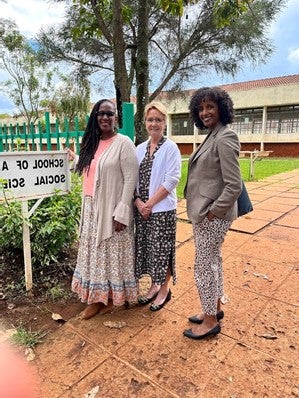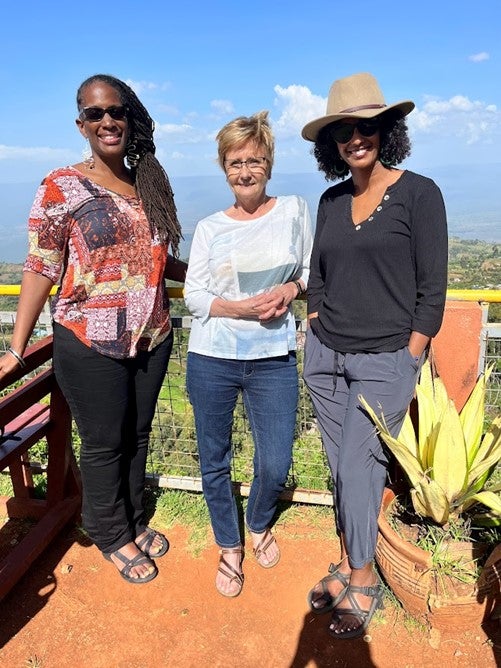Social work is, inherently, a holistic, inclusive, and expansive discipline. Social workers focus on context, the strengths of communities, and the ways that lives interconnect. In line with this, the School of Social Work (SSW) is always looking for ways to provide their faculty and students more opportunities to learn, collaborate, and work with others. This spring, the School had a chance in East Africa. Three of the Program Directors (Dr. Yodit Betru, Director of the MSW program; Dr. Toya Jones, Director of the BASW program; and Dr. Tonya Slawinski, Director of Field Education) traveled to Uganda and Kenya to explore possibilities for expanding global offerings to expand the curriculum and to enhance the students’ experiences. 
Pitt has a standing connection with East Africa through its immersive summer program that is run in Uganda and Western Kenya. This program is led by Dr. Louis Picard of the Graduate School of Public and International Affairs (GSPIA) with close collaboration with the Center for African Studies (CAS). The existing Pitt program is a summerlong immersion in East Africa that matches students with community organizations focused on healthcare, education, economic development, human rights, and research practice. Students are encouraged to apply their academic knowledge to real-world challenges they encounter. For this trip Dr. Macrina LeLei, (CAS), helped plan, facilitate, and accompany the Pitt faculty and students for this year’s execution of the East Africa program.
Drs. Picard and LeLei worked with Drs. Betru, Jones, and Slawinski to orient them to the region, history, key government and local officials, and to suggest and arrange meetings with key potential collaborators in universities and organizations. Drs. Picard and LeLei were instrumental in planning and facilitating the faculty’s itinerary and experiences. CAS and the Hewlett Foundation provided generous funding to make it possible for the Pitt Social Work faculty to participate in the trip. Drs. Betru, Jones, and Slawinski were extremely grateful for and excited by this possibility. Planning and traveling together gave them a chance to work together in a new way, think in less siloed ways about possibilities, and get to know each other very well during their months of preparation and 2 weeks of travel! For each faculty member, it was also a personally meaningful journey – for Dr. Betru, it as a return to the continent where she was born and lived as a young child (in nearby Ethiopia), for Dr. Slawinski, it was a chance to explore the rich culture and history of a region she had not previously visited, and for Dr. Jones, it was an opportunity to visit the continent that forms a core part of her identity as an African-American.
International travel involves a whirlwind of preparation (obtaining visas, vaccinations, expedited passport renewal, and travel permissions and arrangements) that are even more complicated and extended when it also involves connecting and coordinating with potential professional colleagues at the destination. After an intensive period of planning and preparing, the group touched down at Entebbe Airport in Uganda on May 8, 2022, following, as Dr. Jones noted, a “grueling” 24 hour journey from Pittsburgh.
What was the first impression? While all were surprised at the tropical beauty of Uganda, Slawinksi noted that “I was astonished at how much stuff you can get on the back of a small motorbike, or, as they call them here, a Boda Boda!” Fortunately, perhaps, the group was not expected to navigate public transport or try their luck on a Boda Bodas. Rather, Drs. Betru, Jones, and Slawinski traveled by van with experienced, dedicated local drivers arranged by Dr. Lelei. This proved an especially prudent choice when it came to crossing the border between Kenya and Uganda, where paramilitary soldiers displayed frightening and idiosyncratic interpretations of what paperwork and fees were needed to travel between the two countries.
During their initial time in Uganda, Drs. Lelei and Picard introduced the Pitt SSW team to Victoria Nalongo Namusisi. “Mama Victoria” as she is called by so many, left her career in journalism and scouting to adopt two orphaned children and subsequently adopted many more, in the process creating an entire ecosystem of education, medical care, and economic development. Her resulting organization, Bright Kids Uganda (BKU), in Entebbe is a 501 C (3) focused on helping “street kids, HIV/Aids orphans, children with various
physical and psychological disabilities, children who have been living at Internally Displaced People’s Camps, and those rescued from the rebels in Northern Uganda.” The SSW team was deeply moved by their experiences at BKU – by the level of need, the overwhelming stories and challenges, the depth of caring, the abundance of pride and magnanimousness, and their profoundly moving and joyful interactions with the children and youth. Betru, Jones, and Slawinski also were fascinated by the ways in which Bright Kids expanded and shifted their operations during COVID-19 to provide housing, education, and care for children who didn’t have another safe place to live during the ravages of a worldwide pandemic in a developing nation.
Bright Kids Uganda’s activities and infrastructure extend well beyond direct care and services with children. It also recognizes the complex set of social determinants that affect children and families. So, for example, Victoria Nalongo also runs a microloan program, which has been extremely successful at establishing women in their businesses of handicrafts that they can sell for profit. Professor Jones noted that “Microloans help Ugandans fund their businesses including clothes, jewelry, basket weaving, Boda Boda repairs, food, restaurants, wood carving, anything you can imagine that with hard work and an enterprising spirit can be turned into a family sustaining livelihood.”
As a trauma specialist, Dr. Jones marveled at the extent of mental health recovery she saw in women and children who had experienced significant trauma through domestic violence, acid attacks, and being orphaned or abandoned as children. She wondered “How have they progressed so far along in their healing?” As the group got to meet with survivors and those who were working with them, she noticed that, for example, with acid burn victims, the approach to therapy was very personally tailored, often pairing a client with someone who has had a similar traumatic experience, to “join with her, and talk with her, to establish trust and empathy over shared experience, before permitting any social work professional to come in.” It is an approach that is talked about and taught about explicitly in American universities, yet in Uganda, it was deeply moving to see it being used as such a “natural approach, that does not need to be taught.” A tradition of empathy based on shared experience and companionship, combined with hands-on practical help – education, microloans, a seemingly national spirit of entrepreneurial vigor and inventiveness seem to play a deep role in the healing process. Professor Jones concluded: “I realized that the role of purpose, of feeling in charge of your life, is incredibly powerful in healing from trauma in Africa.
In Uganda, the Pitt team met with faculty, staff, students, and administrators at two universities. At Kasubi University they learned about the school’s existing undergraduate program and faculty requested consultation and assistance from the Pitt group in Kasubi’s efforts to develop an MSW program. They also discussed possible student exchange options and ways for Pitt students to potentially live on Kasubi’s campus during their exchange.
Uganda Christian University also has an undergraduate social work program and has enrolled its first cohort of MSW students. It also has a very structured and well-established field education program, and Betru, Jones, and Slawinski visited several of the affiliated social service agencies, which could provide Pitt students with assigned field placement arranged prior to arrival in Africa as well as living arrangements and supports in the local community. UCU also has established connections with other US-based universities, that could create a broader range of connections for Pitt SSW students, faculty, and programs.
After nine days in Uganda, the Pitt team crossed the border to Kenya. In Kenya, meetings were arranged at MOI University and the University of Nairobi. MOI is the oldest and one of the largest universities in Kenya, with a long history of working with Pitt and CAS. The main campus is approximately 45 minutes outside of the city of Eldoret. It has an established BASW program exists and a new MSW program, and the SSW team met with faculty in social work, information technology, law and education. MOI University also partners with AMPATH, a USAID-funded initiative that focuses on holistic healthcare that addresses core social/health problems -- HIV/Aids, emphysema, maternal well-being, and health/well-being of orphans and other vulnerable children. MOI is also closely connected with a consortium of other US universities that participate in AMPATH-led initiatives. Meetings with MOI focused on a range of topics around health care and potential opportunities for students.
The University of Nairobi was the group’s final set of meetings. This prestigious urban-based, and well-resourced institution has the oldest BASW program in the country and has requested support in developing an MSW program. Given its resources, reputation, and setting, the University of Nairobi has robust exchange programs and could offer Pitt students a different type of urban and more independent experience.
As they reflected on their trip, Drs. Betru, Jones, and Slawinski were struck by the enormous opportunities to build on Pitt’s ongoing relationships and broader international consortia and connections to expand Pitt Social Work’s global offerings and engaged in expanded learning on a global scale. It could also provide new ways for SSW to work with Pitt’s Center for African Studies (CAS), GSPIA, and other schools/units that are working with colleagues in this region. In summarizing the trip, Dr. Betru noted that “there is an enormous opportunity here to offer transformational learning experiences in a global context to our students and faculty. It would be a mutually beneficial relationship and an exchange of culture, ideas, techniques of healing and growth - that would enrich at a personal and institutional level.”
